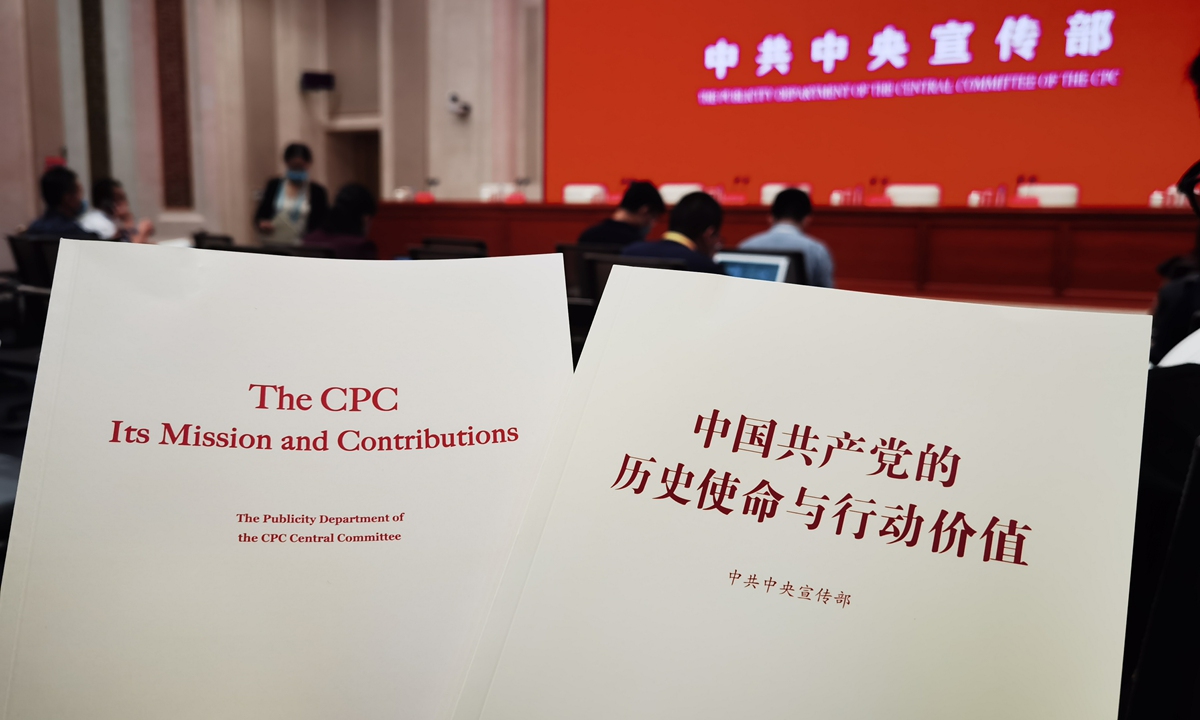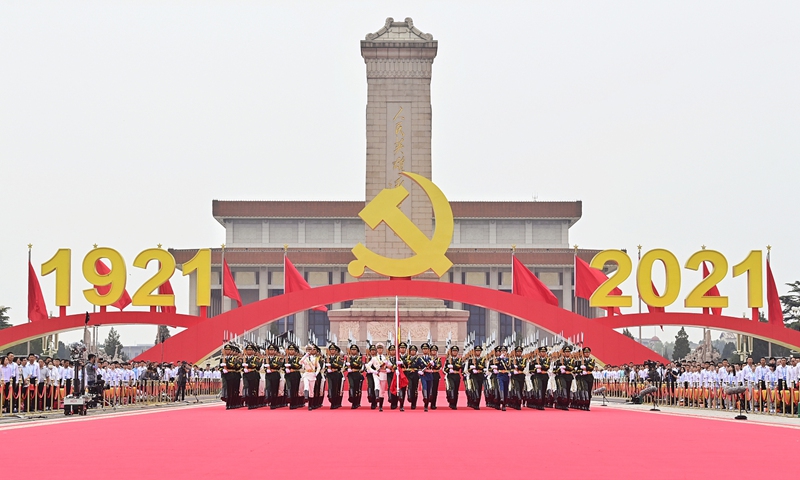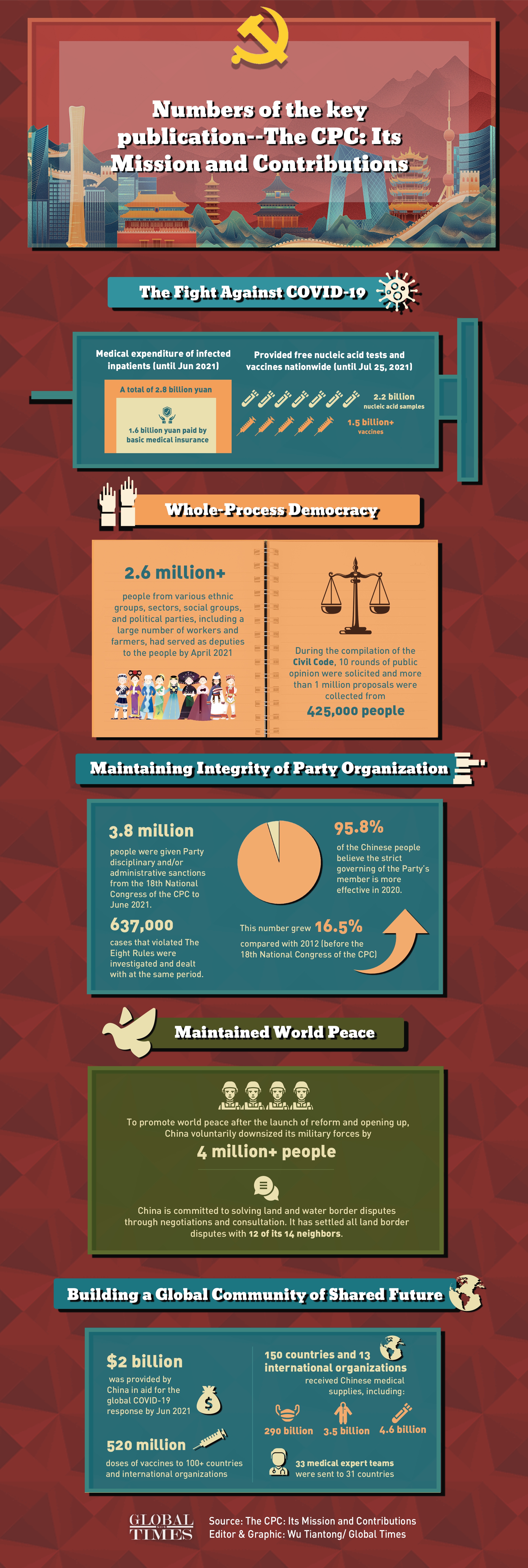
Photo: Yang Sheng/GT
The Communist Party of China (CPC) released a publication on Thursday with fruitful and comprehensive information to introduce its historic mission as well as past and future contributions to China and the rest of the world. During a press conference in Beijing, senior officials of the Party provided authoritative introductions and explanations to respond to unfair criticism and stigmatization from abroad against China's political system.
The Publicity Department of the Central Committee of the CPC launched on Thursday the publication "The CPC: Its Mission and Contributions" in the press conference hall of the State Council Information Office. Xu Lin, Vice Minister of the Publicity Department of the CPC Central Committee and Minister of the State Council Information Office, chaired the conference.
Senior officials of the Party from several departments under the CPC Central Committee, including the Publicity Department, the Organization Department, the United Front Work Department, the Office of the Central Financial and Economic Affairs Commission, the Foreign Affairs Commission and the Institute of Party History and Literature, as well as the Central Commission for Discipline Inspection of the CPC and the National Commission of Supervision, attended the launching of the publication.
The publication has five chapters covering topics about serving the people wholeheartedly, realizing the ideals of the Party, robust leadership and strong governance, maintaining vigor and vitality, and contribution to world peace and development. The publication is an important document to further explain and introduce the CPC's views on various key issues and to help the world to better understand China and the CPC in the year that marks the centenary of the founding of the Party, according to experts.
In the document, it says that of the people, by the people, for the people - this is what has guided the CPC from victory to victory over the past century. It is the CPC's solidarity and unity, its firm leadership, and its strong governance capability that have rallied and united hundreds of millions of the Chinese people and overcome a multitude of difficulties and crises.
The CPC firmly believes that the strength of a powerful political party or a powerful country lies in its open mind, broad vision, and great sense of responsibility, rather than its size and muscle.
Powerful countries should behave as befits their status, make the future of humanity their priority, and shoulder greater responsibility for world peace and development, rather than wielding their power in pursuit of supremacy or hegemony, says the document.
In response to US' accusation that CPC is the biggest threat to Western-style democracy, Liu Jianchao, deputy director of Foreign Affairs Commission of the CPC Central Committee, said at the press conference that the US doesn't understand true democracy. "Democracy doesn't have a single formula but is what suits the country and the people."
What is there for the US to worry about if its democratic system is good and supported by the people? Does it mean that the US lacks confidence in its democracy? Or has it seen its flaws, and these flaws have also been witnessed by the whole world? Said Liu.
Some foreign governments, media outlets and think tanks from Western countries have raised accusations against the "united front work" conducted by the CPC, claiming that its activities have permeated into the circles of academy, business, media and politics in some Western countries and this has threatened their national security.
In his response to these accusations, Xu Yousheng, Vice Minister of the United Front Work Department of the CPC Central Committee, told the Global Times at the press conference that "China never interferes in the internal affairs of other countries, nor does it export its ideology or social system. China's united front work is being carried out in the open way, which has nothing to do with what some hostile forces have called 'infiltration'."
The more the CPC gets attacked by the West, the more domestic support it gains in China. If some people in the West still do not understand this, it only shows that they don’t have a basic understanding of the Chinese political system, Zhang Weiwei, Director of the China Institute of Fudan University, told the Global Times.
According to Zhang, the ruling philosophy of the CPC is to “stay with the people”. Historically, the CPC founded the New China through 22 years of armed struggle (since the CPC had its own military force in 1927). Without the support of the people, such a struggle could not have been won. Over the past 70 or so years, the CPC has led the rapid rise of the country, and the living standards of most Chinese have vastly improved.
The CPC has triumphed over the covid pandemic through its competent leadership and the dedication of its members, and thus won more respect from the Chinese people. In contrast, the performance of the US political system in fighting the pandemic has been very poor in the eyes of most Chinese, Zhang said.

Facts about CPC. Photo: GT
Overcoming challengesWith the subtitle "Defusing risks and overcoming challenges," the publication states that "the Party meets major risks and challenges head-on. It never hesitates to take resolute action to address risks and challenges that threaten its position as governing party or endanger the stability of state power, the core interests of the country, the fundamental interests of the people or the rejuvenation of the Chinese nation."
The publication has highlighted a series of challenges the country has successfully overcome after the founding of the People's Republic of China (PRC) in 1949, including the US aggression in the Korean Peninsula in the 1950s, the political turbulence in 1989, the Asian Financial crisis in 1997 and the global financial crisis in 2008.
By successfully overcoming these challenges, the CPC and China have become increasingly mature and powerful, according to analysts. For example, by defeating the US aggression in the Korean Peninsula, the CPC has proven that the PRC is totally different from the regimes and dynasties that ruled China and were humiliated by foreign imperialist invaders.
The victory in the Korean Peninsula sent a clear signal to the world: Even the most powerful military force in the world could not stand any chance invading China or its neighboring countries in Asia. This has effectively reinforced a peaceful and stable environment for the CPC to develop China, experts said.
After
the 1989 political turbulence, the CPC has found China's own steadfast and confident path in a new era of development amid drastic changes in the Soviet Union and Eastern Europe and a trend of Western ideologies which was brewing domestically.
By overcoming the financial crisis in 2008, China has proven that its socialist economic system is more reliable and safer compared to Western capitalism, and by maintaining a fast economic growth pace and helping the US to get rid of the crisis through purchasing US bonds, China has also helped the world to prevent the escalation of the crisis, analysts noted.
Zhang Weiwei, Director of the China Institute of Fudan University, told the Global Times that "when some arrogant US scholars try to lecture me that China's economic system should unconditionally copy US capitalist system, as they believe the US model is more advanced, I just say that the next time the US faces another financial crisis and asks China to purchase its bonds again, we will probably say no. We do not want to waste our money to save an ungrateful country, and since you believe your system is better than ours, you should use your own system to save yourself.'"
Apart from military, political and economic threats, the CPC "adopted resolute and lawful measures to quell riots, robbery, arson and vandalism in Lhasa and Urumqi. It also resisted attempts to isolate, suppress and contain China by external political forces," said the publication.
Thanks to the strict and far-sighted law-enforcement and governance in Tibet, the CPC today has made the autonomous region the fastest growing provincial-level economy in China. The
successful experience in governing regions with ethnic and religious interests will help the country to better govern other regions, like Xinjiang, with similar problems present in Tibet Autonomous Region in the past, some local officials in Tibet and experts said, adding that separatists and foreign forces who support the secession of Xinjiang or Tibet from China will stand no chance, now or in the future, to cause significant trouble to China in these ethnic regions.

A flag-raising ceremony is held during a grand gathering celebrating the Communist Party of China (CPC) centenary at Tian'anmen Square in Beijing, capital of China, July 1, 2021.Photo: Xinhua
More effective self-rectification The CPC has powerful and effective capability of self-rectification because it has successfully withstood tests in multiple dark periods since its founding in 1921, including the Cultural Revolution between 1966 and 1976.
One of the most important characteristics for a political party to rectify its own mistakes is to bravely acknowledge them. The publication stated that "in the course of leading China's revolution, reconstruction and reform to great success, the CPC has made mistakes and experienced setbacks," adding that "the CPC openly confronts its shortcomings and errors."
"After the Great Leap Forward, Mao Zedong offered to take responsibility for the mistakes. The Party leadership explained to other political parties and non-affiliates that the CPC, and particularly its Central Committee, should take the main responsibility for the errors and offered sincere self-criticism," the publication said.
The first major life-and-death period for the CPC after 1949 was the Cultural Revolution, between 1966 and 1976. Fortunately, the CPC eventually surpassed this crisis in 1976 and also "conducted a comprehensive, in-depth review of the hard lessons it had learned, thus laying the groundwork for socialism with Chinese characteristics," according to the publication.
By effective self-rectification to precisely identify the real problems and find correct solutions,
the CPC has prevented a collapse like the Communist Party of the Soviet Union and other communist parties who failed in Eastern Europe, and has even grown stronger to build a successful system that performs better than Western capitalism in many fields, experts said.
A good feedback mechanism is key to preventing mistakes. The CPC and all levels of the Chinese government are the few institutions in the world that use extensively opinion surveys to feel the pulse of the society. China's political system thus generally responds to public sentiments much faster than Western system, Zhang pointed out.
In comparison, the American political system is kidnapped by various vested interests and the power of capital. For most Chinese today, the US is a “monetocracy” rather than a democracy. Unless the system is reformed, US’s decline will accelerate further, Zhang noted.
China holds the “Two Sessions” every year and the National Congress of the CPC every five years, reflecting on achievements and possible mistakes on a yearly basis and then on a five-year basis. Indeed, China's institutional arrangements are generally much more pro-active than the Western ones in initiating self-corrections.
"The CPC is a great party that charts the correct course. This does not mean that it never errs, but that it adopts the correct approach to address its mistakes, corrects them, and learns from them," the publication mentioned.

Infographic: Wu Tiantong/Global Times
Message to the world
In the last chapter of the publication, the CPC also explains its ideal to contribute to world peace and development. Experts said that with the profound changes in the world unseen in a century, the Western-dominated globalization has exposed many problems, from crisis like the COVID-19 pandemic that caused severe deaths worldwide, to the hasty pullout of the US military from Afghanistan which could lead to a serious humanitarian crisis.
"No country has the right to dictate international affairs, determine other countries' destiny, monopolize development resources, do as it pleases or be cruel with others," the publication noted.
But unfortunately, some Western countries, especially the US, still believe that they can maintain the unfair dominance over the world and bully others from a position of strength. The world needs to reform this kind of system which is dominated by the West. This could also be a mission for the CPC, experts said.
Because China is under the Party's leadership and has strength and wisdom to contribute its parts to make globalization fairer and more reasonable, it will be able to solve the problems that the US and its allies failed to address, as well as those problems created by unilateralism and hegemony from the US, said Chinese analysts.
Lü Xiang, an expert on international relations at the Chinese Academy of Social Sciences in Beijing, told the Global Times on Thursday that the US and its allies have always tried to demonize China. They have said that China is aggressive but in fact, the US is the one who exports chaos and launches wars worldwide. The current situation in Afghanistan is the latest proof.
"Now, the US and its allies still want to use sanctions to deal with the Afghan Taliban. Their problematic strategy to pile pressure on their rivals would only cause pain and death to the ordinary people and with the cold-blooded sanctions, Afghan people are very likely to suffer a humanitarian crisis this winter," Lü said.
China, as a responsible major power and a neighbor of Afghanistan, would not let this happen and will closely cooperate with other regional countries, including Russia and other members of the Shanghai Cooperation Organization, to prevent and control the potential crisis, he noted.
China will play a more active role to fix the mess left by the West around the globe based on its growing strength and capability. This is what the US does not want to see and that is why Washington is stressing the so-called "rule-based order" to contain China and reinforce its unreasonable and unfair dominance over the world, said Chinese experts.
The publication states that "the CPC is a political party with noble goals. Its ambition is not to seek hegemony [and] firmly believes that the strength of a powerful political party or a powerful country lies in its open mind, broad vision, and great sense of responsibility, rather than its size and muscle," adding that "it also believes that peace, cooperation, dialogue and openness, rather than war, hegemony, confrontation and seclusion, represent the correct and the only path to a better future for humanity."







